Travelling as a vegetarian in China is undoubtedly the most daring thing I’ve done till date. I’m talking about a time when lunch was the most dreaded time of the day. A time when I frantically searched the streets for something edible, something that could potentially fill me up. I was warned about this. They said, “You’re vegetarian. China might not be the best option for you to travel.” But the decision was made and I simply had to go.
To be honest, I did not know how I was going to make it when I boarded my flight to Shanghai. An additional concern was the language – not being able to explain that I’m vegetarian. Nevertheless, I made it. Travelling as a vegetarian in China has ever since been my most dramatic escapade.
For the fear of being served animal parts or creepy insects, I remained committed to consuming just fruits and bread for 2 weeks straight. But now, I would like to help fellow vegetarian travellers by means of my blog. Know that it won’t be a cakewalk, but it isn’t impossible either.
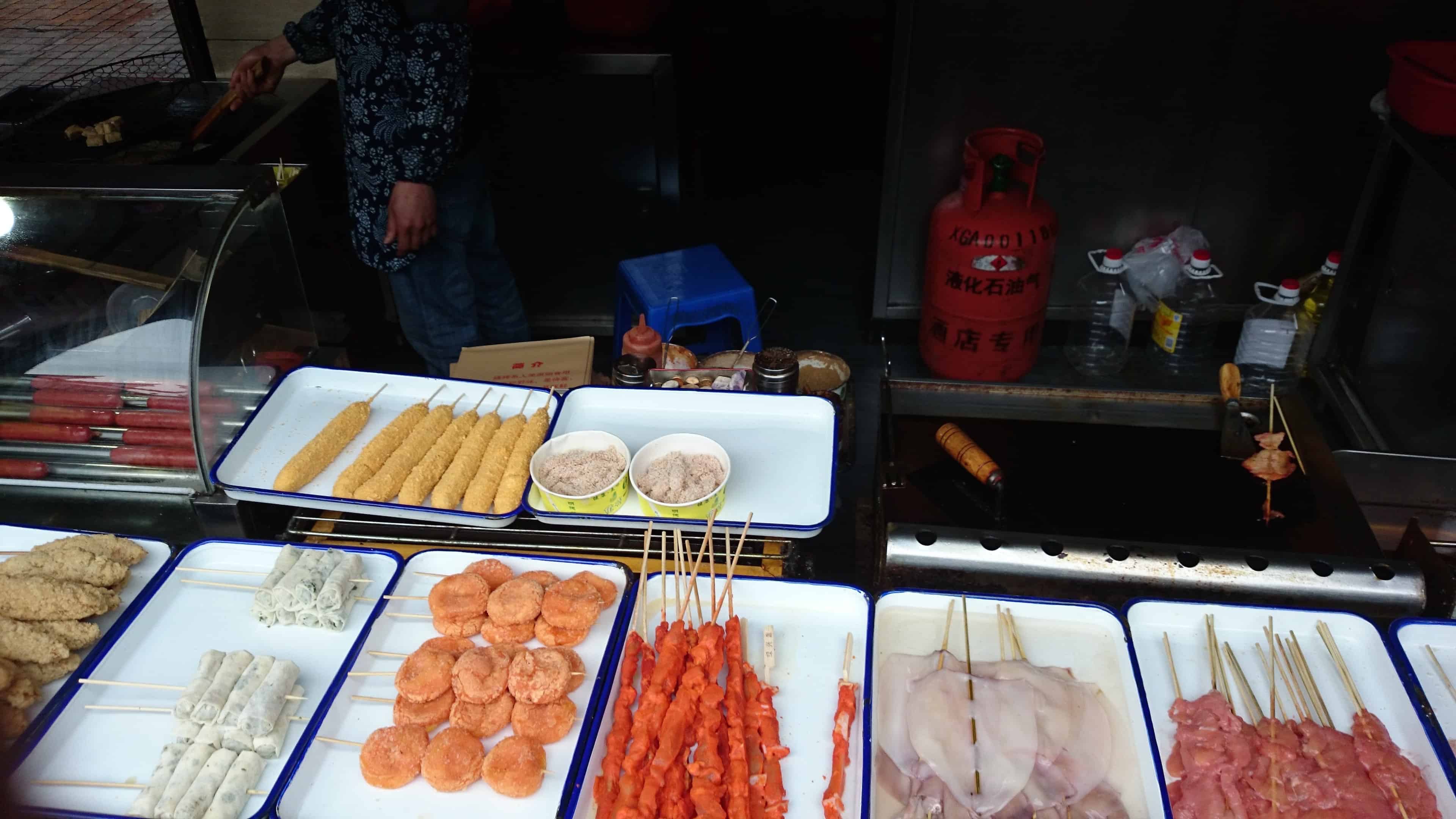
Travelling as a Vegetarian in China: A Brief Overview
China is a lovely country for travellers and you must overcome factors that hold you back from exploring this wondrous Asian nation. During my stay in China which lasted months, I was able to travel to a completely offbeat place like Ningbo as well as make my way and sink in the glamour of high and mighty Shanghai. By the way, Shanghai is one terrific place that you should visit. Trust, me the reasons for visiting a terrific place like Shanghai are far too many.
Before I go into the details of surviving as a vegetarian in China, it is important that you have knowledge of the basic travel aspects.
| Best time to visit
China is vast. It really depends on which part of the country you decide to visit. |
| Currency
The currency used in China is Yuan (written as CHY, and symbolized as ¥). The conversion rates between CHY, the American Dollar (USD) and the Indian Rupee (INR) are as follows: 1 USD = 7.1 CHY; 1 CHY = 10 INR Note that I’ve mentioned the conversion rates between CHY and INR because India is my homeland. |
| Language
Mandarin is the official language. The younger generation is generally able to converse in English. |
| Must remember
Google doesn’t work in China. |
| Must have
A dictionary or a smartphone application for translation. |
| Does China have vegetarian delicacies?
Most certainly |
| Is food in China cheap?
Eating out in China can be really cheap even for vegetarians. |
| Safety level
Very high |
| Top travel tip for vegetarians
The focus here should not be the taste of food, but a well-fed tummy. |
Travelling as a vegetarian in China is not easy. Let me be clear on that right at the outset. Walking through markets dominated by meat and seafood, especially when your stomach is longing for food, can be disheartening.
Important Suggestions for Vegetarians Visiting China
If you’re a vegetarian, the following are top tips that you must abide by at all points. While this section offers just a sneak peek into the tips, they’re further elaborated on in the article.
Learn Two Important Phrases
Wo Chi Su (I eat vegetarian) and Who Bu Chi Rou Huo Hai Xian (I don’t eat meat or seafood) are two ‘must know’ phrases if you are travelling as a vegetarian in China.
Write Down Important Phrases
It is important to get the pronunciation of these phrases right. Since it is difficult for a non-native person to speak Mandarin properly, consider taking a printout of the phrases. You may then show it to the person serving you food, as and when required.
Understand How Vegetarianism Works in China
Your conception of vegetarianism is going to be way different from that of the locals. So, make sure you make your definition of it as clear as possible.
Ensure that Dishes You are Served are Actually Vegetarian
Just because you order vegetarian food does not guarantee that you will receive the same. In most places, eggs and even seafood are considered vegetarian. Furthermore, meaty garnishes in a dish that’s meat-free otherwise, are pretty common. So, exercise caution.
Explore the Streets
One of the best ways to treat yourself to a good vegetarian meal is by exploring the streets in China. Street food can prove to be a hell of a rescue spot for you.
Visit Monastery-Run Restaurants
Monasteries across China have small eateries attached to them, that serve vegetarian food. Visit them for authentic vegetarian meals and for a spiritual experience.
Inquire about Vegetarian Restaurants
In China, a vegetarian place might be right at the corner but you might skip it owing to the language. Therefore, always ask people around you. Most of the time, you’ll be pleasantly surprised.
Use Apps that Will Benefit You
While travelling as a vegetarian in China, use the ‘Happy Cow’ app. Not only does this application let you narrow down your searches in terms of vegan and vegetarian options, but also in terms of pricing, area, ratings, etc.
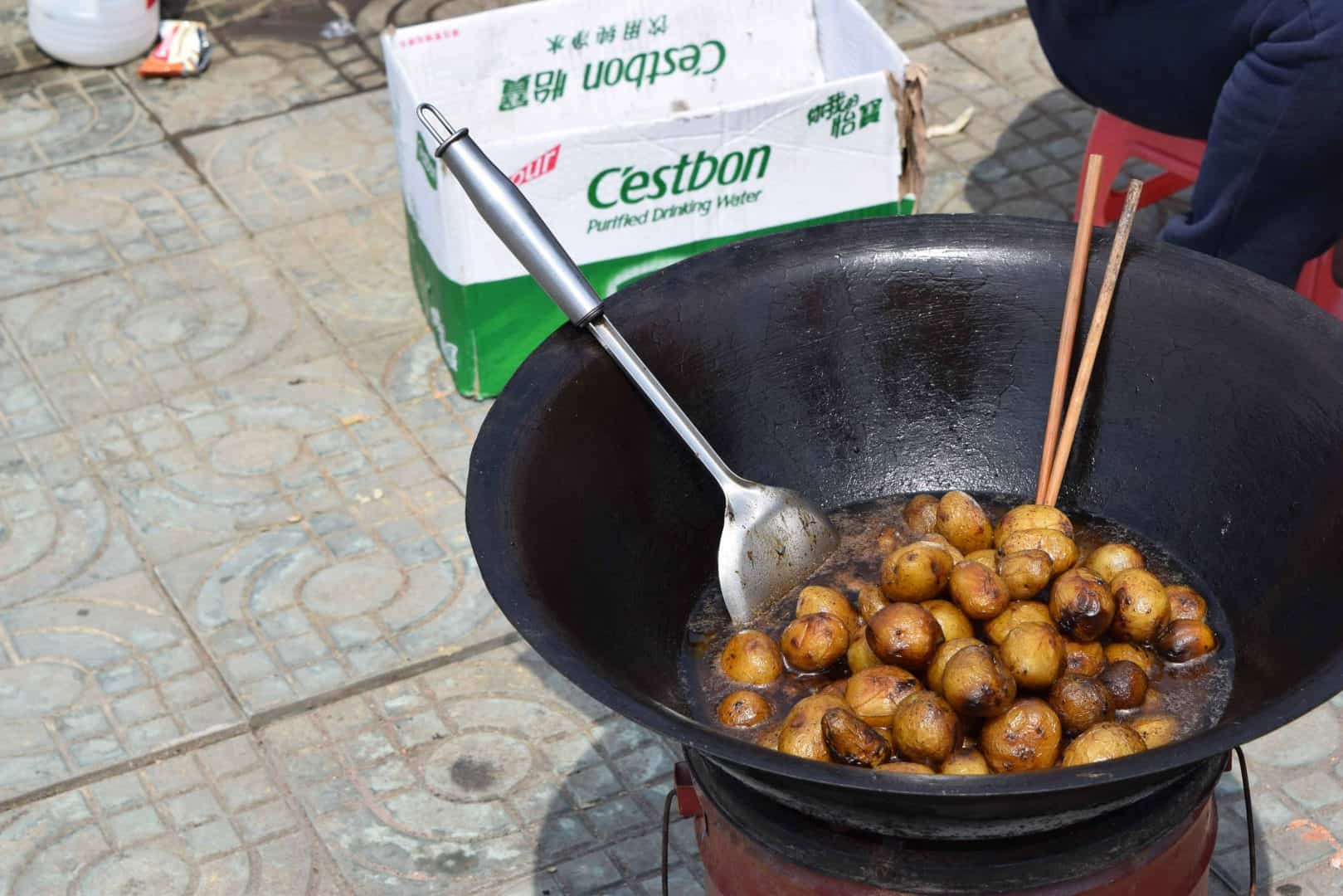
Don’t Miss Out on Experiences
This is my last and most important suggestion to you. Do not miss out on destinations or experiences just because you’re scared. What my trip to China majorly taught me was that travelling is all about making compromises.
China is extremely diverse in what it has to offer to its visitors. Be it the giant pandas, the magnificent Great Wall of China, or the inexplicably cheap shopping. Letting go of so much just because travelling as a vegetarian in China is difficult? Nope. Do not let that happen to you.
Finding Vegetarian Food in China: Getting Your Message Across
When it comes to travelling as a vegetarian in China, the problem isn’t just the unpopularity of vegetarian food. What makes it worse is the existence of an omnipresent language barrier.
The memories of my second day in China are still too fresh in my head. Excited to be all alone in a foreign country, I set out to explore the stunning city of Ningbo all by myself.
| At noon, I made my way to a seemingly “Westernised” restaurant – with hopes to be able to play it safe. A Margherita pizza or a plate of white sauce pasta was on my mind. Since it wasn’t as Westernised as it seemed, I narrowed it down to a rice dish of sorts.
To my horror, a creature with its eyes popping out, soaked in its own blood was presented to me in the form of a fancy platter. I did not indeed have a very pleasant welcome in China. |
Following this very incident, I was systematically taught a few phrases and words that proved to be a saviour while travelling as a vegetarian in China. If you’re a vegetarian, you must learn them too
I eat vegetarian – Wo Chi Su
I don’t eat meat or seafood – Who Bu Chi Rou Huo Hai Xian
Although the former is easier to pronounce and remember, it often means “Buddhist Vegetarian.” Such food is generally devoid of garlic and onions – what eating Jain entails in India. If you want to avoid that, stick to the second option while travelling as a vegetarian in China. You could also have the phrase written on a piece of paper if memorising seems hard.
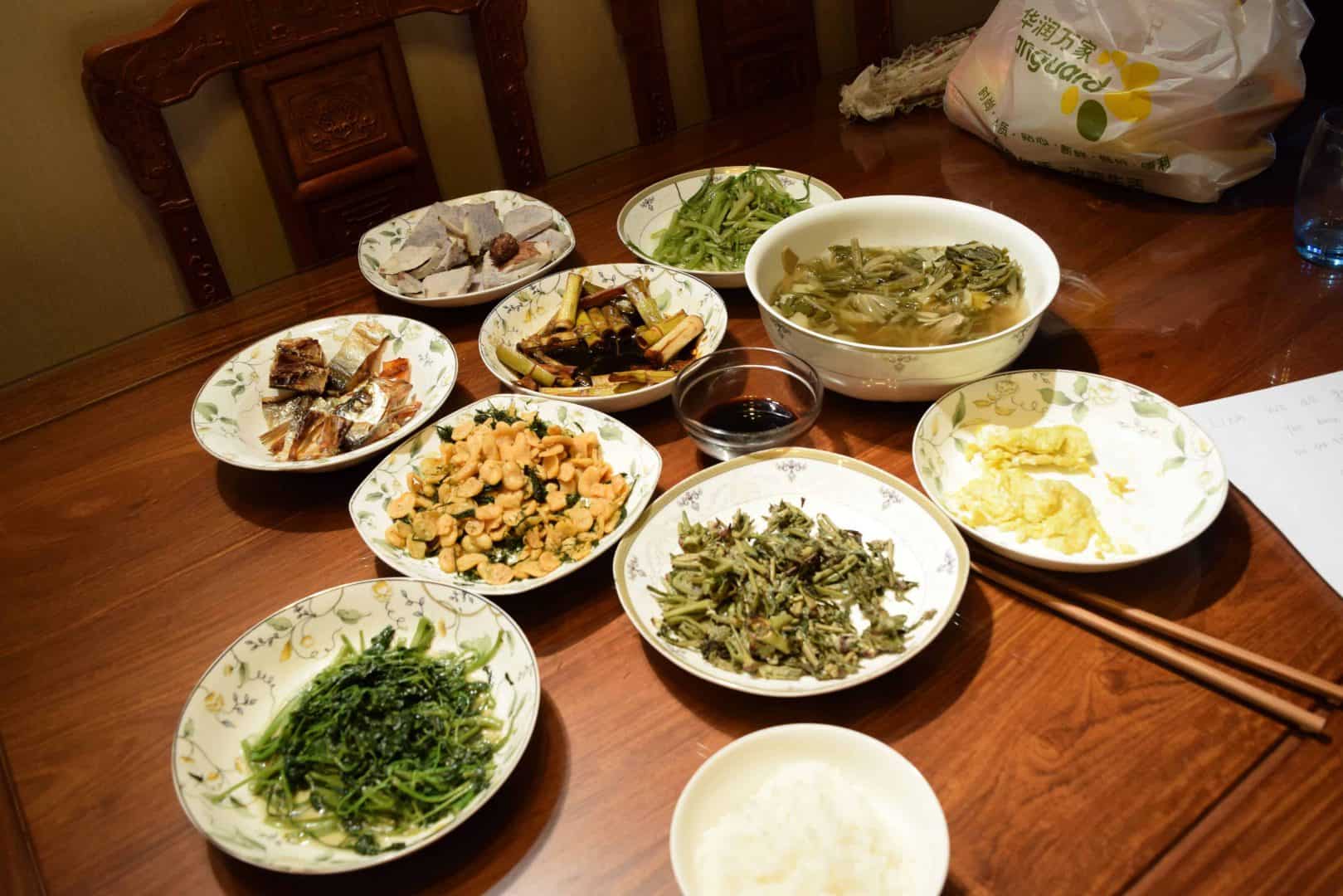
Tip: Remember that Google Translate doesn’t work in China. Knowing that would have helped me avoid the situation I was in for the first 2 days.
The Concept of Vegetarianism in China
Here’s the thing – how vegetarianism is conceptualised in various parts of the world is surprisingly contrasting. While seafood is considered non-vegetarian in India, a large variety of it is consumed by vegetarians in China. Some Buddhists (also vegetarians) in China eat mussels and sometimes oysters too, leading to the complex conceptualisation.
Additionally, a number of curious expressions and questions might follow once you mention the fact that you’re vegetarian. “Are you Muslim?” “Do you have health concerns?” “Are you an animal activist?” These questions are justified keeping in mind the meagre number of vegetarians in China.
| Once, while dining at a fine dining restaurant in Shanghai, I asked if some vegetarian options could be recommended to me. The waiter asked, “Do you eat fish?” making me lose even the remaining hope I had at that point. I suddenly had no expectations of being fed any food at all that night. |
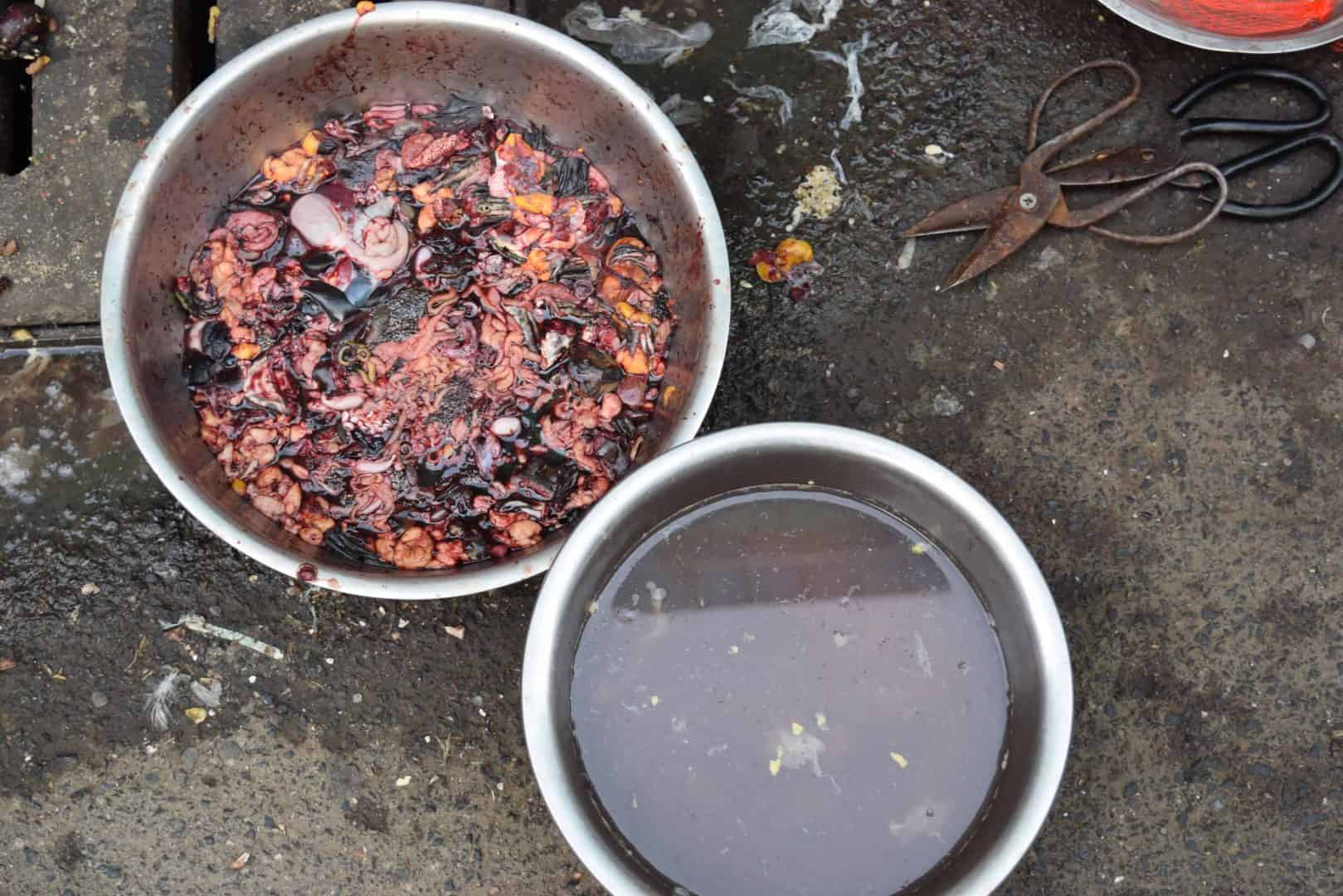
Tip: Try to be patient and accommodating when it comes to culture shocks in terms of food, while travelling as a vegetarian in China.
Don’t Let Your Guard Down – Watch Out for Meaty Surprises
While travelling as a vegetarian in China, at no point can you be off guard? Now while a number of dishes might advertise themselves as “vegetarian,” the chances of it not being so are very high. I can recall ordering “eggplant with garlic sauce” or “vegetable stir-fried noodles,” only to find that it’s cooked in fish sauce or garnished with ham.
Another instance dates back to when I happily called for “vegetable spring rolls,” that contained shrimp. On questioning the presence of shrimp in my apparently vegetarian meal, I was told that it doesn’t contain meat. What could I possibly say to that?
| While you might thus feel helpless and frustrated with the food scene in China, (trust me, that’ll happen a lot), understand that there exists a wide cultural gap. |
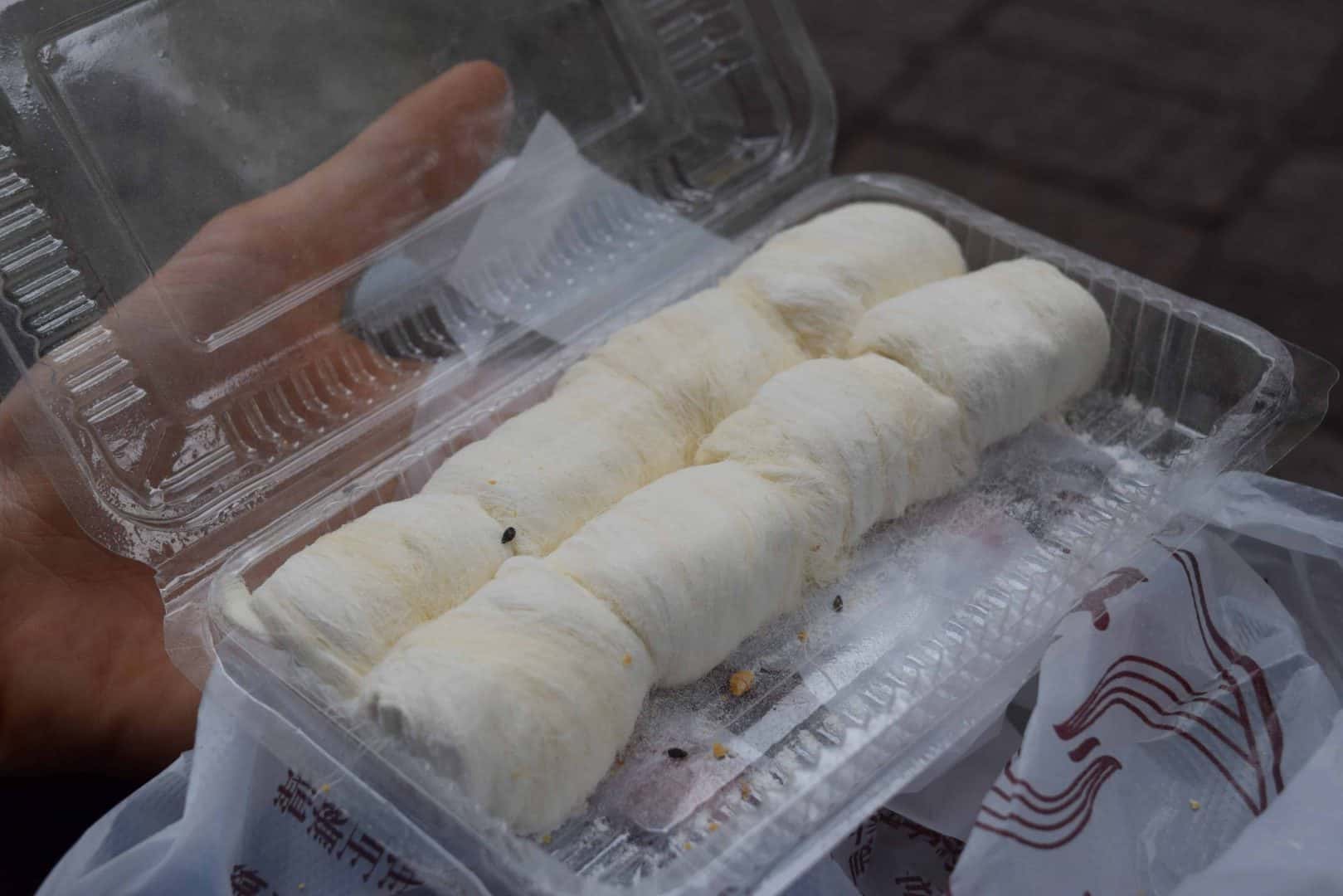
Tip: It would be a good idea to do some prior research on what Chinese conceptions of vegetarian food are.
Travelling as a Vegetarian in China: Hitting the Streets
I still remember that day. A plan was in the making – of venturing out and exploring the endless street food options of Ningbo. I was dreading it. I was definitely not up for hungrily walking through non-exhaustive options of meaty foods.
However, I was easily convinced to accompany my friends by being called a ‘spoilsport.’ We hopped onto a bus, and a 25-minute drive took us to our destination. The next thing I know, I couldn’t stop gazing at the (truly) vegetarian food options that lined the bustling streets of Ningbo.
It finally felt like I’m being fed food that was not only edible by vegetarian standards but also utterly delicious.
Here are some of the dishes you must keep an eye out for if you’re travelling as a vegetarian in China:
Vegetable Dumplings
I came to realize that there were so many times that I simply didn’t ask while travelling as a vegetarian in China. As I sceptically walked around the food market, my Chinese friends ushered me into a little stall run by an old, friendly Chinese woman in her late 60s.
Low wooden tables and low wooden chairs marked the stall, and a red spicy looking sauce was brought to our table. In no time, I was confusedly staring at steaming hot dumplings packed inside a cute bamboo box. I sniffed the steam, trying to figure out what kind of meaty surprise has made its way to my table this time.
“Eat it,” said my friends. I did just as told, only to find out that it was PURE VEGETARIAN. I couldn’t contain my excitement, and couldn’t stop feeling bad about how I’d missed out on this delicacy all this while. If it wasn’t for these beautiful moist bundles of joy, I would be wandering around the markets hungrily or stuffing myself with bread endlessly.
Tip: Assuming wouldn’t work while travelling as a vegetarian in China. Always make it a point to ask.
Morning Glory
Containing no meat and featuring just one main ingredient, this dish is a treasure for spinach lovers and also a light on the pocket.
| Since its name doesn’t make it very obvious, I’ll give you a short description of what the famous morning glory in China is like stir-fried spinach immersed in a soupy sauce made from soybean, infused with strong flavours of garlic. |
It’s a shame that these authentic vegetarian dishes do not mark any of the menus in Chinese restaurants back in India. What’s best about the morning glory is that it is not only a great accompaniment to rice but also tastes great in itself.
Stir-Fried Tomatoes and Eggs (for the Eggetarians out there)
My host family back in Ningbo was quite distressed about having a vegetarian to feed in the house. I was miserable with the thought of making it so hard on them. They were miserable with the thought of not being able to do enough.
One morning, something miraculous happened. A bowl with reddish tomato sauce and what looked like scrambled eggs was lying on the table. Another bowl with rice, of course, lay next to it. “Try it,” I was told.
Trust me or not, that will be the most dreaded phrase while travelling as a vegetarian in China. However, I tried it. I loved it. Surprisingly easy to make, this dish along with a bowl of steaming hot rice, marked almost every dinner that I had at home in China.
Chinese Buns
To my relief, while travelling as a vegetarian in China, I found out that bread is pretty extensively consumed all over the country.
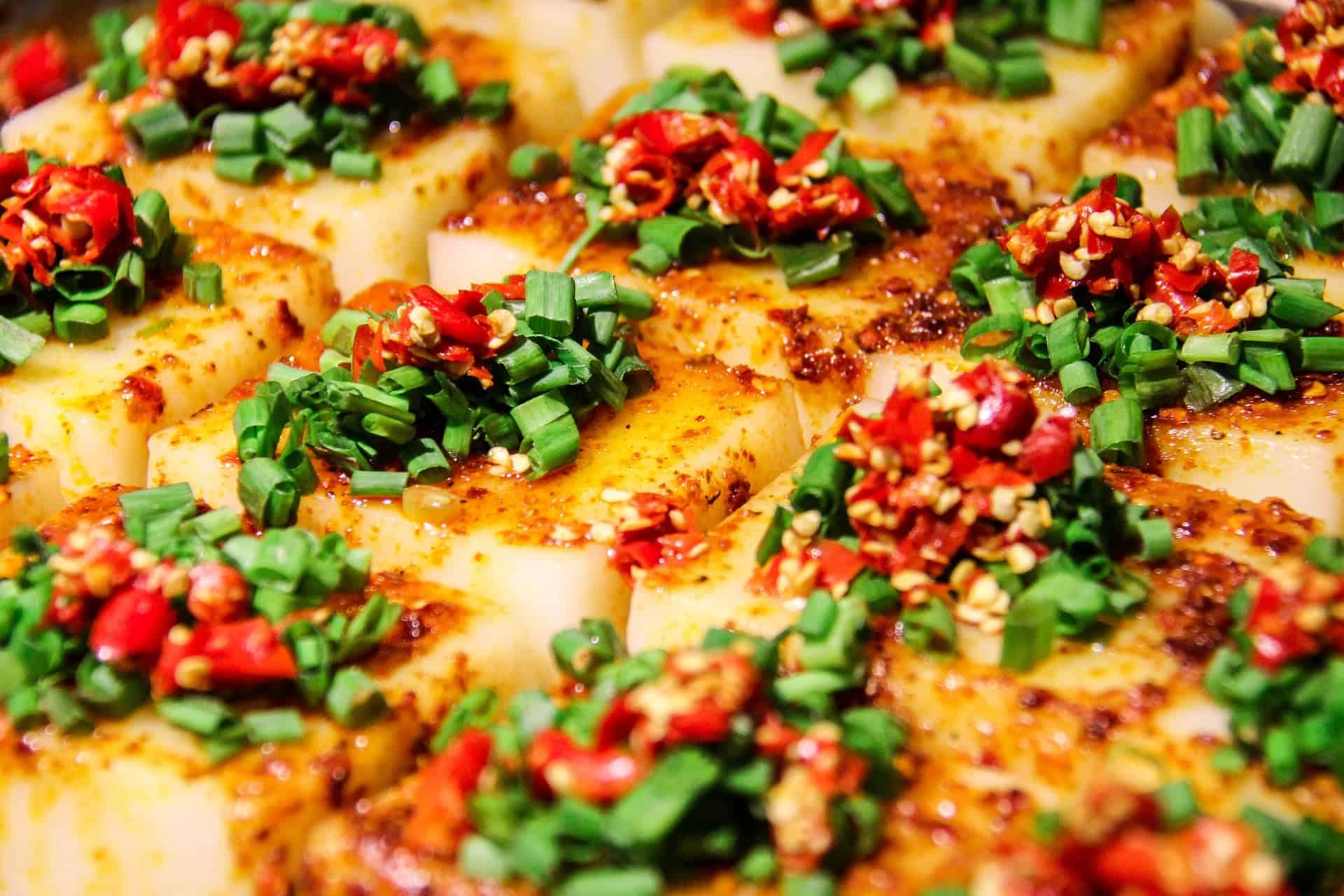
While travelling as a vegetarian in China, I spotted street-side vendors selling these on almost every other street. Watch out, however. It’s never so simple while travelling as a vegetarian in China. Some of these buns do contain small amounts of minced meat, and it would be a good idea to ask about the same before actually ordering them.
Tofu
I ate a lot of tofu during my stay in China. While tofu is healthy, it also fills you up pretty quickly.
Chunky pieces of tofu cooked in a spicy bean chilli sauce totally catered to my Indian roots and tastes. Tofu is the closest substitute to paneer, and spicy is what Indian food is. However, it’s not as rosy a picture as you’re painting in your head. Here’s how the first time eating spicy tofu went for me:
| All seemed to be going well until I took another bite of the spicy tofu I seemed to be relishing until that point. I raised my eyebrows and was on guard as I bit onto a brown rubbery substance – one that looked like anything but some sort of vegetable. “Pretty sure that’s….pork,” admitted my Chinese friend. I said nothing for a few seconds. The thought of some amount of pork already having made it to my tummy made me sick. But something made me pick up my spoon once again. I ended up finishing all of the spicy tofu, as I cautiously avoided the minced pork. That’s how tasty it was. |
Tip: If you are someone who’s travelling on a tight budget, street food is an extremely economical option. Dishes generally range from 2-10 CHY (0.3-1.4 USD).
To be honest, the options are endless. While these are dishes that top my list, there’ll be many more you’ll stumble upon while travelling as a vegetarian in China. All you need is a little patience, and the thirst to explore.
Visiting Monasteries – Providers of Vegetarian Food
On one of the days during my stay in China, it had been 7 hours since I’d had anything to eat. My head felt dizzy and my belly gnawed at the sight of huge masses of meat dangling by the streets. I was sick of stuffing myself with fruits and bread.
Then something amazing happened. I happened to cross a monastery. A board installed right at the entrance read “serving fresh vegetarian food.”
| While religion has never been my go-to, it certainly ended up being one, while travelling as a vegetarian in China. A number of these monasteries run small restaurants that serve simple, vegetarian food. These restaurants are definitely a great alternative, for you do not have to constantly be on guard, or be on the lookout for meaty garnishes. |
I walked out of that monastery feeling more content than I ever had. My tummy was happy, and so was my soul. Since that very day, I’d always kept my eyes open for monasteries – never thought this day would come being the staunch atheist that I am. Travel does wonders.
Looking for Vegetarian Restaurants in China
A number of links will pop up if you google search “vegetarian restaurants in China.” While I was surprised when I did this myself, I eventually came to realize that it really is a globalizing world. In addition to a number of vegetarian restaurants, I even dined at vegetarian Indian restaurants while travelling as a vegetarian in China.
| “Serving vegetarian food has helped me tap into a completely new market segment. It is not only the meat eaters but also the vegetarians and the vegans that happily dine at my restaurant now. We need to keep adapting to changing times and changing trends,” said Zhang Yu, owner of a Chinese restaurant I had dinner at while in Hangzhou. |
One evening, while strolling at a park in Ningbo, I happened to strike up a conversation with 2 locals. I told them my story of why I was in China, along with telling them how I was struggling with food every single day. They sympathised with me and asked if I wanted to grab dinner with them. I immediately agreed to something that felt very right. To my surprise, they took me to a vegetarian restaurant right around the corner – strange how I was so unaware of it.
Tip: Oftentimes, there are vegetarian restaurants that exist, but the problem is not being able to know about the same because restaurant banners are all in Mandarin. So, once again, make it a point to inquire.
The food was absolutely delicious! What’s more is that while every dish looked like meat, what hid under the surface was just vegetables. I hadn’t been so fascinated in a while.
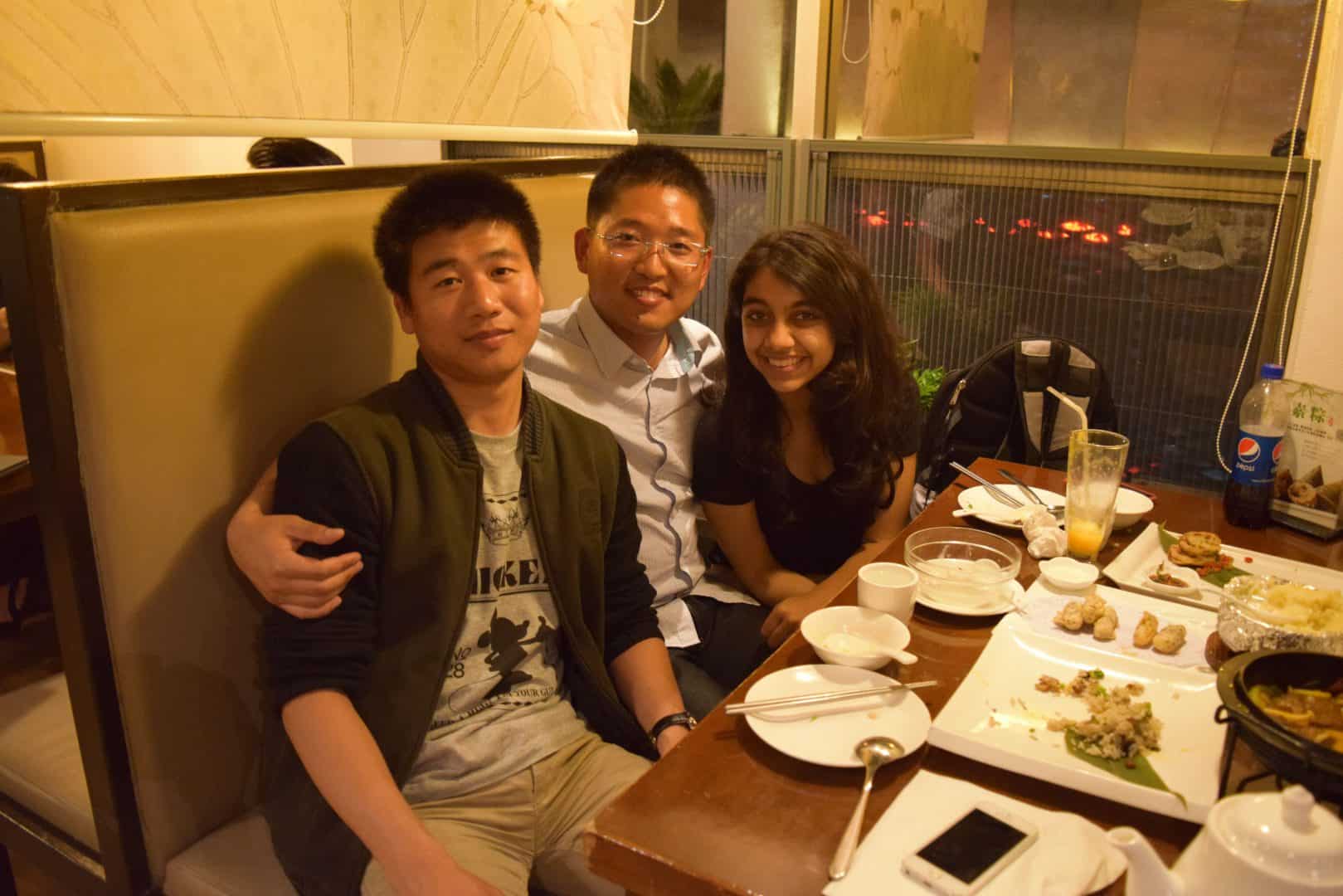
Vegetarians, Try The Happy Cow App
In a world that is dominated by technology, it would be a shame to not take advantage of certain apps that can help you out. There are a number of people out there who feel deeply for vegetarians. Some kind of soul decided to build a smartphone application that would enable vegetarians and vegans to browse through vegetarian restaurants in over 175 countries all across the world. The app is known as Happy Cow.
| It can be downloaded for free on Android devices, and by paying a nominal fee on Apple devices. Being able to find out vegetarian restaurants at the sheer disposal of a smartphone is almost a luxury. Not only does this application let you narrow down your searches in terms of vegan, vegetarian and veg options, but also in terms of the pricing, area, ratings, etc. |
Unfortunately, I was unaware of this application while travelling as a vegetarian in China, back when I traveled. However, I’ve been using it during my travels otherwise, and it has worked amazingly. It will certainly help you have a more comfortable trip while travelling as a vegetarian in China.
Commonly Used Ingredients in Vegetarian Chinese Delicacies
It’s important that you know and pronounces vegetarian ingredients correctly while travelling as a vegetarian in China. Before I introduce you to some, here’s a funny anecdote I’d like to recite:
| “We have ordered vegetarian food for you,” my friends told me.
“What does it contain?” I asked them. “Semen! It’s really tasty!” they responded excitedly. “SEMEN?” I exclaimed. I could do nothing but wait to see what this “one of a kind” dish was… Within minutes, a vegetable gravy and sesame noodles were presented to me. They mispronounced big time and all of us had a big laugh. |
Therefore, the moral of the story is to pronounce words correctly in China especially when it comes to food. Else, you’ll end up making a fool of yourself.
Sesame is one of the ingredients widely used in vegetarian food in China. Thankfully, vegetables in Chinese food are used in large quantities.
Following are other such ingredients, and dishes they taste great in –
| Eggplant – Eggplant with spicy garlic sauce |
| Tofu – Spicy tofu, sweet tofu pudding |
| Bamboo shoots – Bamboo shoots in a broth |
| Spinach – Stir-fried spinach |
| Red beans – Red bean paste buns, red bean soup |
| Cabbage, tomatoes, carrots – Stir-fried, eaten with rice |
When I was back from my China trip, I found myself craving a number of these dishes – no kidding. I certainly did not expect to crave Chinese food, out of all the things.
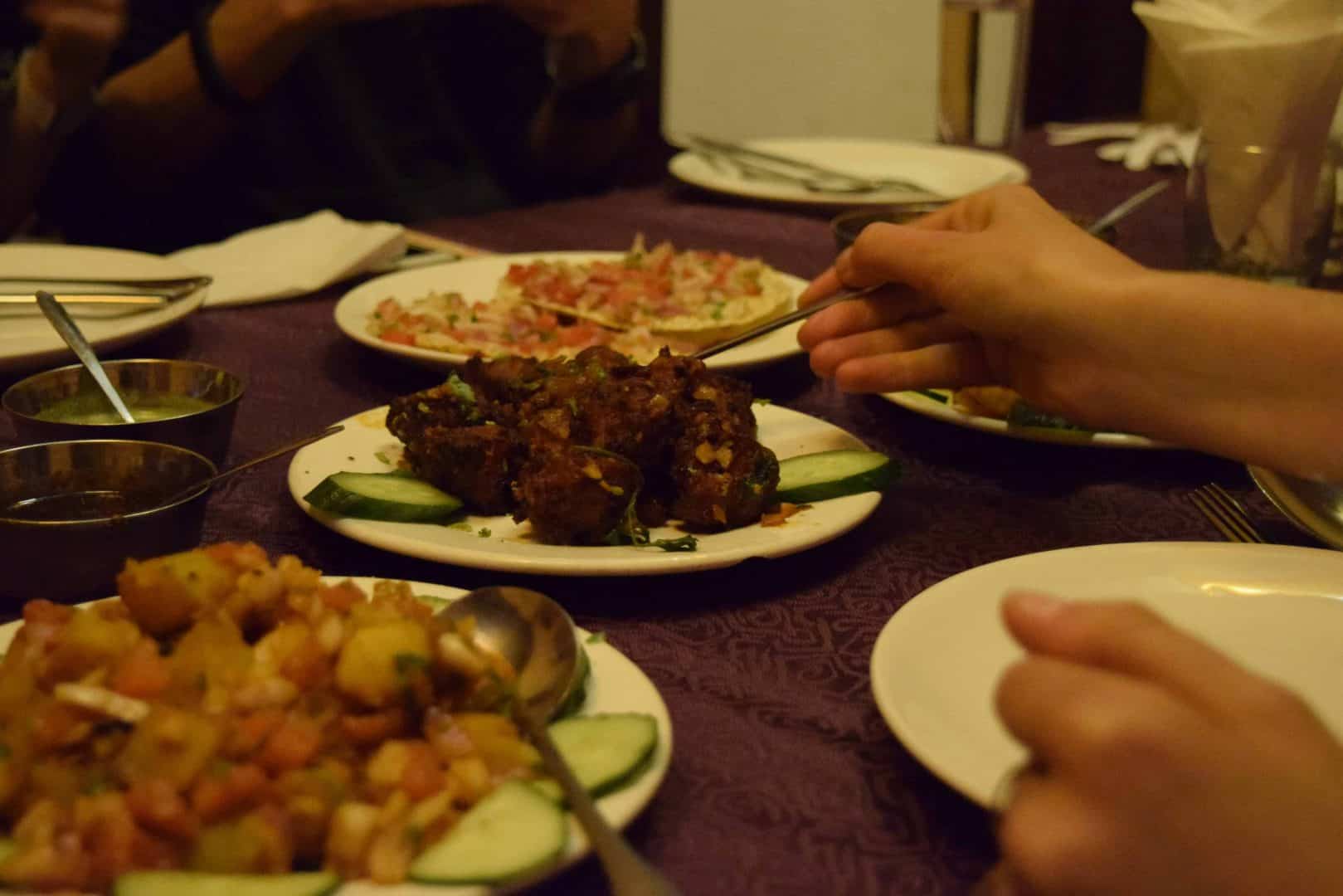
Vegetarian Food Tours
To be honest, it did get easier for me because I had local friends to accompany me around. Feeling lost in the absence of a local company is highly likely. So, if you could use some help, enrol yourself for a vegetarian food tour. You won’t find this in smaller towns, but definitely in cities like Shanghai, Beijing and Hangzhou.
This is not just a great way of trying out local vegetarian delicacies, but also a great to learn the art of finding vegetarian food. You can grasp some words, go-to places, and other hacks that will help you navigate your way in the meaty land.
Travelling as a Vegetarian in China: How Bad Really is it?
To be honest, China never stopped testing my patience. Just when I thought I was doing fine when it came to food, I would come across some meat in my apparently vegetarian food. However, with a little exploration and a little patience, I realized that I really did not have to wander with an empty stomach. I did not have to stress every time dinner approached.
I came to the understanding that it was equally difficult for my host family to cater to my strict, vegetarian demands.
What my trip to China majorly taught me was that travelling is all about making compromises. It is all about pushing your boundaries. It’s about doing things you once thought you never could.
If you’re somebody who avoids travelling to certain countries owing to your vegetarianism, please don’t. You’d be missing out on a world full of beautiful destinations, beautiful people & beautiful experiences.
Take the leap. You’ll come back with miraculous stories.
Happy wayfaring 🙂


